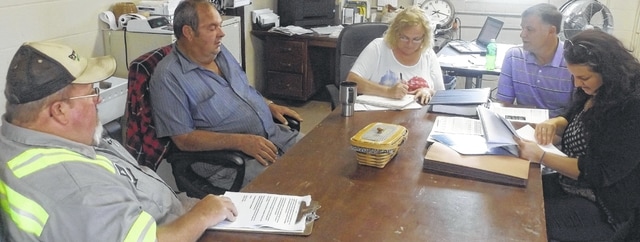
JEFFERSON TOWNSHIP — Officials in Jefferson Township are thinking of ways to raise revenue for the general fund after recent cuts of state aid for local governments.
“We’ve been working on this since January trying to figure out which route to go,” said Trustee Bob Stroud. “They cut out money, so we’ve got to make up for it somewhere. I don’t know where it’s going to be.”
“We used to get an estate tax, and we don’t get it no more,” said Dale Cochran, also a trustee.
“The state is keeping (tax revenue that used to go to local government assistance) and balancing their budget, and it’s making it look bad on all the local governments,” Cochran also said.
Trustee Joe Panetta was absent.
In 2016, Jefferson Township anticipates raising $16,000 in revenue for its general fund. In 2015, it projected $19,000 in revenue and $25,000 in expenses, according to documents provided by Jefferson Township Fiscal Officer Donna M. Lansing. To date, it has raised $20,000 and spent $18,600.
Donna M. Lansing, who faces an election challenge from Donna Panetta Lansing, expects a deficit by the end of the year.
“We can’t survive that way,” Donna M. Lansing said. “We have cut everything I think we can cut, and we have allocated (to other funds) everything I think we can allocate.”
Donna M. Lansing said she would present the trustees with a resolution combining their current general fund tax levy of 0.6 mills with their 0.8 mill roads and bridges tax levy. That would result in a 1.4-mill general fund tax levy. While roads and bridges expenses would have to be paid from that levy, the trustees would have more flexibility over the money, according to Clinton County Auditor Terry Habermehl.
Combining those levies, which are “inside millage,” meaning they don’t require voter approval, would also levy $1,000 in taxes on residents of Midland. Midland residents don’t have to pay taxes on the roads and bridges levy but do have to pay general fund levies, according to Deputy Auditor Logan Bailey.
It would move $10,000 to the county’s general fund.
Donna M. Lansing stressed that non-general funds of the trustee’s budget were OK. But, non-general funds must be spent on specific, earmarked projects, while the general fund’s spending is at the discretion of the trustees.
“We do have to do something,” she said, adding that the township’s loss of revenue mostly stems from cuts to state aid for local governments and sources of local taxes. Cochran and Stroud agreed with her assessment.
Donna M. Lansing later said the township’s largest expenses are its insurance premiums and propane, which is used for the township building and the fire department building – until the new fire house is built.
That fire house, Lansing, Stroud and Cochran stressed, is being paid for by a $500,000 grant from State Fire Marshal Larry Flowers. No match is required from Jefferson Township, according to Donna M. Lansing.
The deadline for tax levies that require voter approval has passed for this year, meaning such a levy wouldn’t be on the ballot until 2016, and tax collections from that levy, if passed, wouldn’t be seen until 2017. The township would also have to pay election costs.
Bailey said the trustees could explore the idea of using road and bridge carryover for 2016 to pay for road and bridge expenses and use the combined millage to sustain the general fund until a ballot could be voted on. Then, the trustees could choose to reinstate the road and bridge levy, which would also relieve Midland residents from their tax burden.
Bailey also suggested the trustees consider a cemetery levy to relieve the general fund of its costs.
Another idea the trustees can consider, according to Assistant County Prosecutor Andrew McCoy, is to assess a $5 vehicle registration fee on residents in the township.
That assessment wouldn’t need voter approval but could only be used for the roads, which could relieve pressure from the road and bridge fund.
Habermehl said his office has received calls from other political subdivisions that were “in the same boat” as Jefferson Township.
“Sounds like every township’s having the same problem we are,” Cochran said.
On the ballot for 2015, Jefferson Township is asking voters to renew a 5.25-mill tax levy for fire protection and other emergency services.
Reach Nathan Kraatz at 937-382-2574, ext. 2510 or on Twitter @NathanKraatz.


